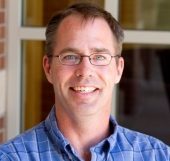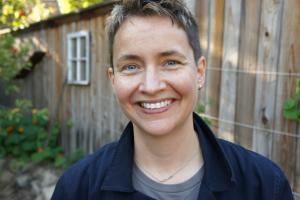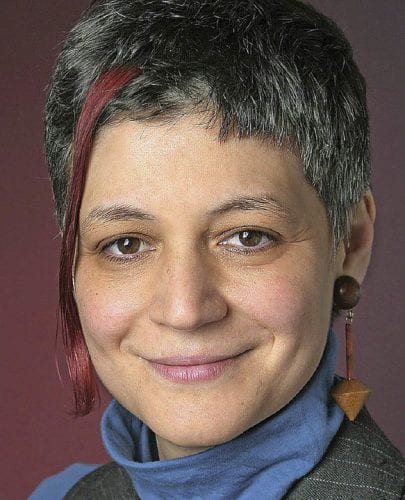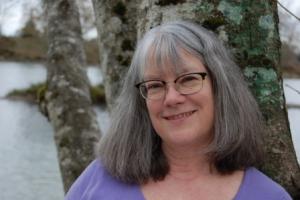Directors
 Emily Eliza Scott is an interdisciplinary scholar, educator, artist, and (joint) Assistant Professor in the History of Art and Architecture & Environmental Studies at the University of Oregon. She has authored numerous essays on art and design practices that engage pressing (political) ecological issues and is currently writing a book on art that tracks, and thereby resists, various forms of environmental violence. She has co-edited three volumes: The Routledge Companion to Contemporary Art, Visual Culture, and Climate Change (Routledge, 2021), Viscosity: Mobilizing Materialities (UMN Architecture, 2019), and Critical Landscapes: Art, Space, Politics (UC Press, 2015). Her work has been supported by major grants/awards from Creative Capital, the College Art Association, American Council of Learned Societies, Smithsonian American Art Museum, Nevada Museum of Art, and Graham, Luce, Mellon, Annenberg, and Switzer Foundations, among other institutions. She is also a founding member of two collaborative art projects, World of Matter (2011-17) and the Los Angeles Urban Rangers (2004-present). Prior to entering academia, she worked for nearly a decade as a National Park Service ranger in Utah and Alaska.
Emily Eliza Scott is an interdisciplinary scholar, educator, artist, and (joint) Assistant Professor in the History of Art and Architecture & Environmental Studies at the University of Oregon. She has authored numerous essays on art and design practices that engage pressing (political) ecological issues and is currently writing a book on art that tracks, and thereby resists, various forms of environmental violence. She has co-edited three volumes: The Routledge Companion to Contemporary Art, Visual Culture, and Climate Change (Routledge, 2021), Viscosity: Mobilizing Materialities (UMN Architecture, 2019), and Critical Landscapes: Art, Space, Politics (UC Press, 2015). Her work has been supported by major grants/awards from Creative Capital, the College Art Association, American Council of Learned Societies, Smithsonian American Art Museum, Nevada Museum of Art, and Graham, Luce, Mellon, Annenberg, and Switzer Foundations, among other institutions. She is also a founding member of two collaborative art projects, World of Matter (2011-17) and the Los Angeles Urban Rangers (2004-present). Prior to entering academia, she worked for nearly a decade as a National Park Service ranger in Utah and Alaska.
 Nina Amstutz is Associate Professor in the History of Art and Architecture at the University of Oregon. Her research explores the boundaries between art and nature since the 18th century. She is the author of Caspar David Friedrich: Nature and the Self (Yale University Press, 2020), winner of the Novalis Prize from the Friedrich Schiller University Jena, and co-editor of Das Bild der Natur in der Romantik: Kunst als Philosophie und Wissenschaft (Brill,2021). Her current book project explores multispecies approaches to writing about art. Using the bowerbird’s practice of collecting and arranging decorative objects to attract amate as a point of departure, the project questions the humanist commitments of art history as a discipline. Her first publication from this project, “The Avian Sense for Beauty: A Posthumanist Perspective on the Bowerbird,” was published in Art History (2021). Amstutz is also a curator. In 2024, she co-curated Policing Justice at the Portland Institute for Contemporary Art (PICA), which examined police violence in Portland, Oregon, and its relationship to longer local and national histories of oppression. Her work has been supported by major grants from the University of Toronto, the Yale Center for British Art, the Getty Research Institute, and the American Council of Learned Societies.
Nina Amstutz is Associate Professor in the History of Art and Architecture at the University of Oregon. Her research explores the boundaries between art and nature since the 18th century. She is the author of Caspar David Friedrich: Nature and the Self (Yale University Press, 2020), winner of the Novalis Prize from the Friedrich Schiller University Jena, and co-editor of Das Bild der Natur in der Romantik: Kunst als Philosophie und Wissenschaft (Brill,2021). Her current book project explores multispecies approaches to writing about art. Using the bowerbird’s practice of collecting and arranging decorative objects to attract amate as a point of departure, the project questions the humanist commitments of art history as a discipline. Her first publication from this project, “The Avian Sense for Beauty: A Posthumanist Perspective on the Bowerbird,” was published in Art History (2021). Amstutz is also a curator. In 2024, she co-curated Policing Justice at the Portland Institute for Contemporary Art (PICA), which examined police violence in Portland, Oregon, and its relationship to longer local and national histories of oppression. Her work has been supported by major grants from the University of Toronto, the Yale Center for British Art, the Getty Research Institute, and the American Council of Learned Societies.
Steering Committee
Lisa Arkin is Executive Director of Beyond Toxics. Prior to her work with Beyond Toxics, Arkins spent thirteen years as an educator and associate professor at both Stanford University and University of Oregon. She has since accumulated deep experience in toxics use reduction advocacy, land use planning, environmental protection and strategic development for non-profit organizations. Lisa has served as Executive Director since 2005.
 Dr. Karin Bolender is an artist-researcher and founder of a collaborative, experimental ecological art platform called the Rural Alchemy Workshop (R.A.W.). The Unnaming of Aliass was published in 2020 by 3Ecologies/punctum, and she was a co-editor of The Promise of Multispecies Justice (Duke, 2022). She is presently working with Swedish art-agriculture platform Kultivator on a three-year project funded by the Swedish Research Council called Tell the Field She Wants to be a Meadow (2025-2027). Engaging methods across contemporary art and environmental humanities, Bolender interweaves artistic, academic, philosophical, and other fields of inquiry. Her work has been featured internationally in numerous venues. She lives in rural Oregon with a family herd of humans, canines, herbivores, and others.
Dr. Karin Bolender is an artist-researcher and founder of a collaborative, experimental ecological art platform called the Rural Alchemy Workshop (R.A.W.). The Unnaming of Aliass was published in 2020 by 3Ecologies/punctum, and she was a co-editor of The Promise of Multispecies Justice (Duke, 2022). She is presently working with Swedish art-agriculture platform Kultivator on a three-year project funded by the Swedish Research Council called Tell the Field She Wants to be a Meadow (2025-2027). Engaging methods across contemporary art and environmental humanities, Bolender interweaves artistic, academic, philosophical, and other fields of inquiry. Her work has been featured internationally in numerous venues. She lives in rural Oregon with a family herd of humans, canines, herbivores, and others.

Mark Carey is Professor of History and Environmental Studies in the Robert D. Clark Honors College, University of Oregon. His work links environmental history and the history of science through studies of climate change, glacier-society interactions, water resource management, natural disasters, and mountaineering—particularly in the Andes and Polar Regions. He co-edited The High-Mountain Cryosphere: Environmental Changes and Human Risks (Cambridge, 2015). His other books are: Glaciares, cambio climático y desastres naturales: Ciencia y sociedad en el Perú (IFEA/IEP, 2014); and In the Shadow of Melting Glaciers: Climate Change and Andean Society (Oxford, 2010), which won the Elinor Melville Award for the best book on Latin American environmental history. He has also published nearly 40 peer-reviewed articles and book chapters, and has received four National Science Foundation grants over the last decade. He runs the Glacier Lab for the Study of Ice and Society at the University of Oregon.
 Liska Chan works at the intersection of landscape architecture and art. Informed by creative geographies, land art, and countermapping, Chan’s creative practice and writing examines invisible influences on landscapes. Her past projects include mapping the invisible histories of Manhattan’s Chinatown, writing about using ritual to memorialize nuclear landscapes, and braiding various grass fields across the American landscape to problematize anachronistic cultural landscape ideals. Her recent projects examine ad hoc repair in vernacular landscapes and the intersection of fashion and landscapes. Chan has been teaching design studios, drawing, and theory in the Landscape Architecture Department at University of Oregon since 2001. Chan served as Head of the Department of Landscape Architecture from 2010 to 2015, and again 2022 to 2023. She also served as Head of the School of Architecture and Environment, Associate Dean of Academic Affairs for the College of Design and Associate Dean for Faculty in the Clark Honors College. Since 2019 she has been a board member of Places Journal. Chan is a graduate of Cornell University (Master of Landscape Architecture) and Hampshire College (BA, Landscape Studies and Sustainable Agriculture).
Liska Chan works at the intersection of landscape architecture and art. Informed by creative geographies, land art, and countermapping, Chan’s creative practice and writing examines invisible influences on landscapes. Her past projects include mapping the invisible histories of Manhattan’s Chinatown, writing about using ritual to memorialize nuclear landscapes, and braiding various grass fields across the American landscape to problematize anachronistic cultural landscape ideals. Her recent projects examine ad hoc repair in vernacular landscapes and the intersection of fashion and landscapes. Chan has been teaching design studios, drawing, and theory in the Landscape Architecture Department at University of Oregon since 2001. Chan served as Head of the Department of Landscape Architecture from 2010 to 2015, and again 2022 to 2023. She also served as Head of the School of Architecture and Environment, Associate Dean of Academic Affairs for the College of Design and Associate Dean for Faculty in the Clark Honors College. Since 2019 she has been a board member of Places Journal. Chan is a graduate of Cornell University (Master of Landscape Architecture) and Hampshire College (BA, Landscape Studies and Sustainable Agriculture).
 Ashley Cordes (Coquille/KōKwel Nation) is an Assistant Professor of Indigenous Media in Environmental Studies and Data Sciences at the University of Oregon. Her research lies at the intersection of Indigenous digital media, place-based environmental storytelling, and Indigenous science and technology studies. She researches how Indigenous culture and technology producers leverage discursive, technological, and media forms of “digital Indigeneity” toward Tribal economic independence, representational/data sovereignty, cultural revitalization, and resurgence of Indigenous TEK systems. Her work appears in journals such as Cultural Studies <>Critical Methodologies and Journal of International and Intercultural Communication. She is the author of Indigenous Currency: Leaving Some for the Rest in the Digital Age (MIT Press). https://ashleycordes.github.io/
Ashley Cordes (Coquille/KōKwel Nation) is an Assistant Professor of Indigenous Media in Environmental Studies and Data Sciences at the University of Oregon. Her research lies at the intersection of Indigenous digital media, place-based environmental storytelling, and Indigenous science and technology studies. She researches how Indigenous culture and technology producers leverage discursive, technological, and media forms of “digital Indigeneity” toward Tribal economic independence, representational/data sovereignty, cultural revitalization, and resurgence of Indigenous TEK systems. Her work appears in journals such as Cultural Studies <>Critical Methodologies and Journal of International and Intercultural Communication. She is the author of Indigenous Currency: Leaving Some for the Rest in the Digital Age (MIT Press). https://ashleycordes.github.io/
 Stephanie LeMenager is Barbara and Carlisle Moore Professor of English and Professor of Environmental Studies at the University of Oregon. Her publications include the books Living Oil: Petroleum Culture in the American Century (2014), Manifest and Other Destinies (2005), and Environmental Criticism for the Twenty-First Century (2011). Her co-edited collection Teaching Climate Change in the Humanities addresses climate change pedagogy and her forthcoming Bloomsbury four-volume collection, Literature and Environment, offers a history of the interdisciplinary field of the environmental humanities through the one hundred most influential published articles in the field. LeMenager is a founding editor and current advisory board member of Resilience: A Journal of the Environmental Humanities, the first Environmental Humanities journal to be based in the United States. She is a recent recipient of the Radcliffe Institute Fellowship for Advanced Study, where she began writing her latest book, about climate change, fiction, and lies. Her work has been featured in The New York Times, Time magazine, Climate Wire, and on CBC radio and NPR.
Stephanie LeMenager is Barbara and Carlisle Moore Professor of English and Professor of Environmental Studies at the University of Oregon. Her publications include the books Living Oil: Petroleum Culture in the American Century (2014), Manifest and Other Destinies (2005), and Environmental Criticism for the Twenty-First Century (2011). Her co-edited collection Teaching Climate Change in the Humanities addresses climate change pedagogy and her forthcoming Bloomsbury four-volume collection, Literature and Environment, offers a history of the interdisciplinary field of the environmental humanities through the one hundred most influential published articles in the field. LeMenager is a founding editor and current advisory board member of Resilience: A Journal of the Environmental Humanities, the first Environmental Humanities journal to be based in the United States. She is a recent recipient of the Radcliffe Institute Fellowship for Advanced Study, where she began writing her latest book, about climate change, fiction, and lies. Her work has been featured in The New York Times, Time magazine, Climate Wire, and on CBC radio and NPR.
 Kate Mondloch (PhD, UCLA) is Professor of Contemporary Art History and Theory in the Department of the History of Art and Architecture in the College of Design at the University of Oregon, where she also serves as a Faculty Fellow in the Clark Honors College. Her research focuses on perception, embodiment, and new technologies in art and the social realm in the late 20th- and early 21st- centuries. She is the author of Screens: Viewing Media Installation Art (University of Minnesota Press, 2010; reprinted with University of Minnesota’s open-access Manifold platform in 2024) and A Capsule Aesthetic: Feminist Materialisms in New Media Art (University of Minnesota Press, 2018). She is currently working on a third book, tentatively entitled Art of Attention, which explores body-mind awareness in 21st century art. Dr. Mondloch has been awarded research fellowships from the American Council of Learned Societies (ACLS), University of California Humanities Research Institute, Banff Centre, and Oregon Humanities Center. Her research has also been supported by the Getty Research Institute, the Clark Art Institute, and the National Endowment for the Humanities. She serves on the advisory board for the Center for the Science and Practice of Well-Being and is a member of the Flourishing Academic Network and the Contemplative Education Network.
Kate Mondloch (PhD, UCLA) is Professor of Contemporary Art History and Theory in the Department of the History of Art and Architecture in the College of Design at the University of Oregon, where she also serves as a Faculty Fellow in the Clark Honors College. Her research focuses on perception, embodiment, and new technologies in art and the social realm in the late 20th- and early 21st- centuries. She is the author of Screens: Viewing Media Installation Art (University of Minnesota Press, 2010; reprinted with University of Minnesota’s open-access Manifold platform in 2024) and A Capsule Aesthetic: Feminist Materialisms in New Media Art (University of Minnesota Press, 2018). She is currently working on a third book, tentatively entitled Art of Attention, which explores body-mind awareness in 21st century art. Dr. Mondloch has been awarded research fellowships from the American Council of Learned Societies (ACLS), University of California Humanities Research Institute, Banff Centre, and Oregon Humanities Center. Her research has also been supported by the Getty Research Institute, the Clark Art Institute, and the National Endowment for the Humanities. She serves on the advisory board for the Center for the Science and Practice of Well-Being and is a member of the Flourishing Academic Network and the Contemplative Education Network.
 Erin Moore, AIA is a Professor in the Department of Architecture and in the Environmental Studies Program at the University of Oregon. She is a graduate of Smith College (BA) and University of California-Berkeley (MArch). She is a graduate of Smith College (BA) and University of California-Berkeley (MArch). Moore is an architect who uses her design research practice FLOAT architecture research and design to explore and advance thought on ideas of nature in architectural design. She works with explicit intentions for material, ecological, and multi-species life cycles. Recent work addresses the architectural space of fossil fuel consumption, biogenic carbon sequestration, and climate change in the context of new materialisms, critical spatial practice, speculative design, and the environmental humanities.
Erin Moore, AIA is a Professor in the Department of Architecture and in the Environmental Studies Program at the University of Oregon. She is a graduate of Smith College (BA) and University of California-Berkeley (MArch). She is a graduate of Smith College (BA) and University of California-Berkeley (MArch). Moore is an architect who uses her design research practice FLOAT architecture research and design to explore and advance thought on ideas of nature in architectural design. She works with explicit intentions for material, ecological, and multi-species life cycles. Recent work addresses the architectural space of fossil fuel consumption, biogenic carbon sequestration, and climate change in the context of new materialisms, critical spatial practice, speculative design, and the environmental humanities.
 Barbara Muraca is an Assistant Professor of Philosophy. Her research focuses on Environmental and Social Philosophy, Process Philosophy, and Political Ecology. Prior to working at University of Oregon she was Assistant Professor of Environmental and Social Philosophy at Oregon State University and Senior Researcher (Post-Doc) at the Center for Advanced Studies ‘Post-growth Societies’ at the Institute of Sociology of the University of Jena, Germany. She is currently co-director of the International Association for Environmental Philosophy (IAEP). Since Summer 2018 she is a Lead Author of the IPBES assessment on multiple values of nature (Intergovernmental Science-Policy Platform on Biodiversity and Ecosystem Services).
Barbara Muraca is an Assistant Professor of Philosophy. Her research focuses on Environmental and Social Philosophy, Process Philosophy, and Political Ecology. Prior to working at University of Oregon she was Assistant Professor of Environmental and Social Philosophy at Oregon State University and Senior Researcher (Post-Doc) at the Center for Advanced Studies ‘Post-growth Societies’ at the Institute of Sociology of the University of Jena, Germany. She is currently co-director of the International Association for Environmental Philosophy (IAEP). Since Summer 2018 she is a Lead Author of the IPBES assessment on multiple values of nature (Intergovernmental Science-Policy Platform on Biodiversity and Ecosystem Services).
 Marsha Weisiger is the Julie and Rocky Dixon Chair of U.S. Western History and an associate professor of history and environmental studies at the University of Oregon. Her scholarship focuses primarily on the environmental history of the American West. She is the author of Dreaming of Sheep in Navajo Country (University of Washington Press, 2009) which won four awards, including the Norris and Carol Hundley Award and the Hal Rothman Book Award, and Land of Plenty: Oklahomans in the Cotton Fields of Arizona, 1933-1942 (University of Oklahoma Press, 1995), which won the Angie Debo Prize. She has also written on wolf reintroduction, gendering environmental history, environmental justice, and architectural history. Her work has received two faculty research fellowships from the National Endowment for the Humanities, a Burkhardt Fellowship from the American Council of Learned Societies, and a King Fellowship from the Clements Center for Southwest Studies. She is a Distinguished Lecturer for the Organization of American Historians and co-founder and co-coordinator of the Cascadia Environmental History Collaborative.
Marsha Weisiger is the Julie and Rocky Dixon Chair of U.S. Western History and an associate professor of history and environmental studies at the University of Oregon. Her scholarship focuses primarily on the environmental history of the American West. She is the author of Dreaming of Sheep in Navajo Country (University of Washington Press, 2009) which won four awards, including the Norris and Carol Hundley Award and the Hal Rothman Book Award, and Land of Plenty: Oklahomans in the Cotton Fields of Arizona, 1933-1942 (University of Oklahoma Press, 1995), which won the Angie Debo Prize. She has also written on wolf reintroduction, gendering environmental history, environmental justice, and architectural history. Her work has received two faculty research fellowships from the National Endowment for the Humanities, a Burkhardt Fellowship from the American Council of Learned Societies, and a King Fellowship from the Clements Center for Southwest Studies. She is a Distinguished Lecturer for the Organization of American Historians and co-founder and co-coordinator of the Cascadia Environmental History Collaborative.
